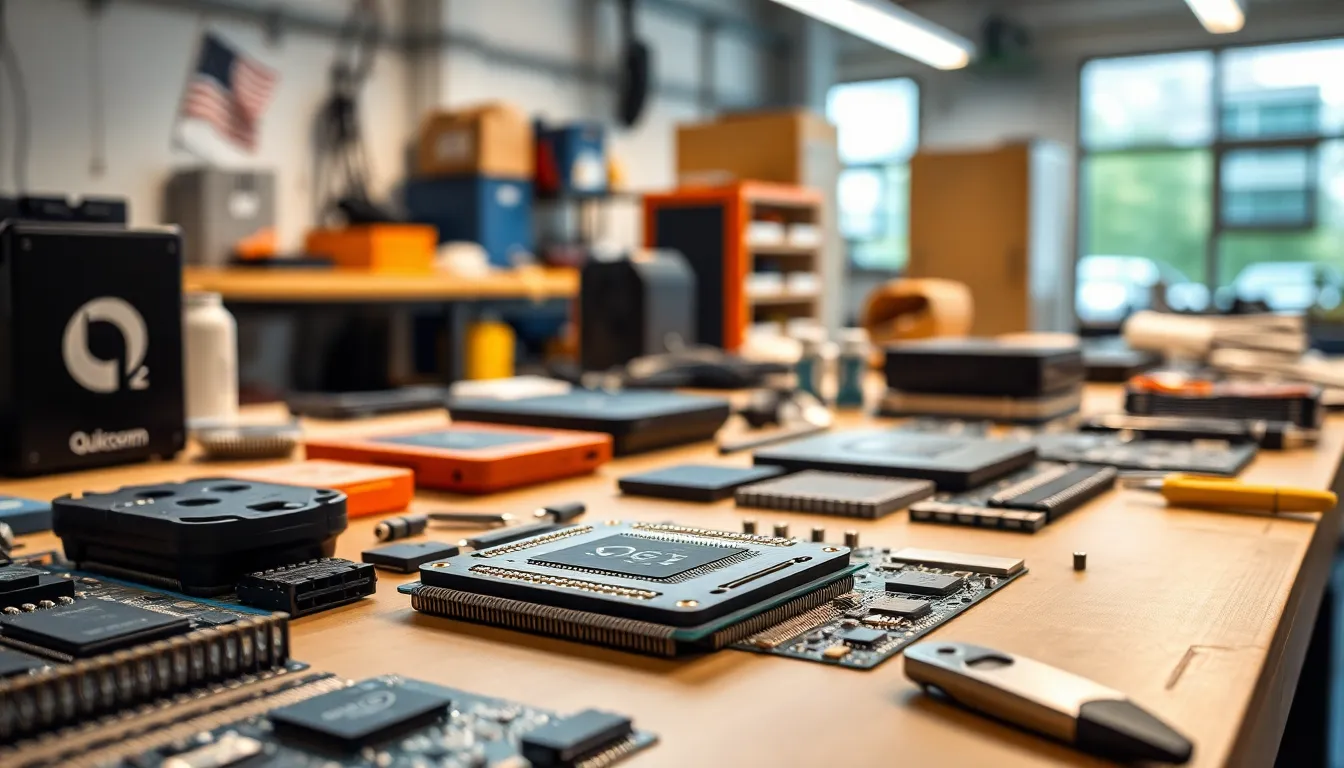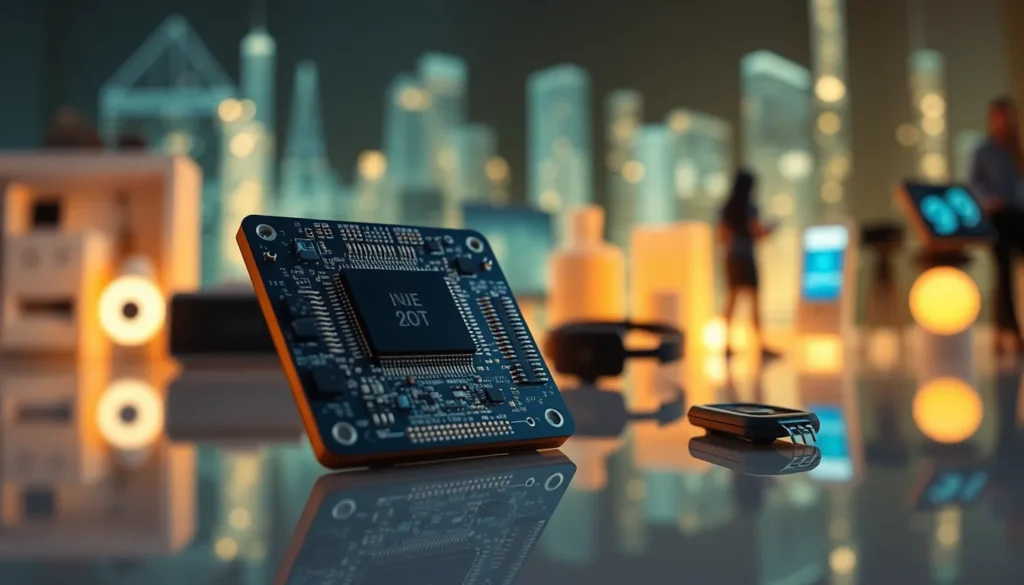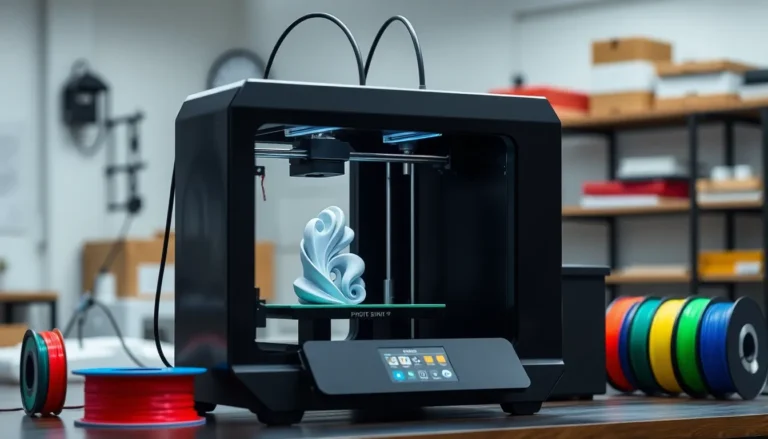Table of Contents
ToggleThe Internet of Things (IoT) is revolutionizing the way devices connect and communicate, making everyday objects smarter and more efficient. At the heart of this transformation are IoT chipsets, which enable seamless connectivity and functionality across a myriad of applications. As industries increasingly adopt IoT solutions, the demand for high-performance chipsets is surging, attracting a diverse range of manufacturers.
These manufacturers play a crucial role in shaping the IoT landscape, providing the essential technology that powers smart homes, wearables, and industrial automation. With advancements in processing power, energy efficiency, and connectivity options, they’re driving innovation and competition in this dynamic market. Understanding the key players and their offerings is vital for anyone looking to navigate the complex world of IoT technology.
Overview of IoT Chipset Manufacturers
IoT chipset manufacturers play a critical role in advancing the capabilities of connected devices. Companies in this sector design and produce chipsets that enable communication, data processing, and energy efficiency. This overview highlights leading players in the industry and their contributions.
1. Qualcomm
Qualcomm is a prominent manufacturer known for its Snapdragon series. These chipsets support a range of applications, from smart appliances to automotive solutions, providing robust connectivity options.
2. Intel
Intel focuses on high-performance chipsets optimized for IoT devices. Their portfolio includes the Intel® Atom™ processor series, suitable for edge computing and industrial applications.
3. NXP Semiconductors
NXP Semiconductors specializes in secure connectivity solutions. Its i.MX series is extensively used in embedded systems, offering various features tailored for smart home and industrial automation.
4. MediaTek
MediaTek develops chipsets known for energy efficiency and affordability. Its Helio series caters to applications such as wearables and smart home devices, emphasizing versatile connectivity.
5. Texas Instruments
Texas Instruments provides a range of low-power microcontrollers and processors. The company focuses on enabling seamless integration of IoT solutions in industrial and consumer markets.
6. Broadcom
Broadcom produces chipsets that excel in wireless communications. Their solutions support various standards like Wi-Fi and Bluetooth, making them essential for smart devices requiring connectivity.
7. Ambarella
Ambarella is known for its video processing and image compression chipsets. These chipsets enhance video surveillance and smart camera applications, emphasizing performance in real-time processing.
8. Nordic Semiconductor
Nordic Semiconductor specializes in wireless connectivity solutions for IoT. Its nRF series supports Bluetooth and thread protocols, ideal for low-power applications in smart devices.
Each manufacturer contributes distinct innovations that drive the IoT market forward, ensuring devices become smarter and more connected. Their ongoing research and development enhance performance, security, and efficiency, crucial for the growth of the IoT ecosystem.
Key Players in the Market

The IoT chipset market features several notable manufacturers pivotal in advancing technology and innovation. Understanding these key players provides insights into their varying contributions and the direction of the industry.
Leading Manufacturers
- Qualcomm: Known for its Snapdragon series, Qualcomm delivers high-performance chipsets that cater to diverse applications, including smart home devices and automotive technologies.
- Intel: Specializing in high-performance chipsets, Intel focuses on edge computing solutions that enhance data processing capabilities and support complex IoT integrations.
- NXP Semiconductors: NXP excels in secure connectivity solutions, offering chipsets that prioritize security and reliability in IoT applications across various industries.
- MediaTek: MediaTek provides energy-efficient and cost-effective chipsets, making IoT solutions more accessible while maintaining performance standards suitable for numerous applications.
- Texas Instruments: Texas Instruments offers low-power microcontrollers designed for seamless IoT integration, emphasizing energy efficiency and ease of deployment in various environments.
- Broadcom: Broadcom is a leader in wireless communications technology, delivering solutions that enable robust connectivity for interconnected devices in smart homes and industrial IoT.
- Ambarella: Ambarella specializes in video processing technology, enhancing capabilities for smart cameras and advanced imaging applications within the IoT ecosystem.
- Nordic Semiconductor: Nordic focuses on low-power wireless semiconductor solutions, which support a range of IoT applications demanding energy efficiency and long battery life.
Emerging Companies
- Espressif Systems: Espressif offers low-cost Wi-Fi and Bluetooth chipsets, catering to developers seeking to create connected devices with a focus on simplicity and efficiency.
- Silicon Labs: Silicon Labs specializes in microcontrollers and wireless chipsets designed for IoT applications, promoting energy-saving features and extensive scalability.
- u-blox: u-blox develops versatile connectivity solutions, including GNSS and cellular modules, enabling precise positioning and communications for IoT devices across industries.
- Sierra Wireless: Sierra Wireless focuses on cellular IoT solutions, providing modules and gateways to support reliable and secure connectivity in remote and mobile applications.
- Raspberry Pi Foundation: The Raspberry Pi offers affordable computing solutions that foster experimentation and innovation, promoting the development of IoT projects among enthusiasts and developers.
Technology Trends in IoT Chipsets
The evolution of IoT chipsets reflects significant technological advancements aimed at enhancing device performance and user experience. Key trends include innovative connectivity solutions and improved power efficiency, both contributing to the rapid growth of the IoT market.
Connectivity Solutions
Leading IoT chipset manufacturers prioritize advanced connectivity solutions. Multiple protocols enable seamless communication between devices, ensuring reliability and minimal latency. Technologies such as 5G, LPWAN (Low Power Wide Area Network), and Zigbee facilitate efficient data transmission over various distances.
- 5G technology provides high-speed, low-latency connections crucial for applications like autonomous vehicles and smart cities.
- LPWAN supports long-range, low-power connectivity, ideal for smart agriculture and environmental sensors.
- Zigbee offers low-power, short-range communications, perfect for home automation devices.
As manufacturers enhance compatibility with diverse communication standards, IoT devices become increasingly interconnected, optimizing functionality and enabling enhanced user experiences.
Power Efficiency Innovations
Power efficiency remains a pivotal focus for IoT chipset manufacturers. With countless devices operating in the field, minimizing energy consumption while maintaining performance is essential. Recent innovations in low-power chipsets drive this trend forward.
- Energy-efficient designs include advanced sleep modes that drastically reduce power usage during inactive periods.
- Dynamic voltage scaling allows chipsets to adjust power consumption based on workload, enhancing battery life.
- Integration of energy-harvesting technologies provides sustainable power sources, especially important for remote sensors and devices in hard-to-reach locations.
These innovations not only extend the operational life of devices but also reduce the overall environmental impact of IoT implementations, fostering a more sustainable future in technology.
Market Challenges and Opportunities
The IoT chipset market faces significant challenges and opportunities that shape its growth trajectory. As competition intensifies, manufacturers navigate a dynamic landscape influenced by technological advancements and consumer demands.
Competition Landscape
Competition among IoT chipset manufacturers highlights innovation, price sensitivity, and market differentiation. Major players like Qualcomm, Intel, and NXP Semiconductors continually enhance their product offerings to retain market share. Smaller firms, such as Espressif Systems and Silicon Labs, often capitalize on niche markets with specialized solutions. Key competitive factors include:
- Performance: Chipsets delivering superior processing power attract industries requiring robust solutions, like autonomous vehicles and industrial automation.
- Cost-efficiency: Affordability influences purchasing decisions, especially among small to medium-sized enterprises seeking to integrate IoT technologies.
- Ecosystem compatibility: Manufacturers that provide comprehensive solutions compatible with various protocols enhance their attractiveness to developers.
This competitive environment fosters rapid technological advancements, pushing manufacturers to innovate continuously.
Future Growth Predictions
Future growth in the IoT chipset market appears promising, driven by increasing IoT adoption across sectors. Industry analysts project a compound annual growth rate (CAGR) of around 25% from 2023 to 2030. Key factors influencing this expansion include:
- Rising demand for smart devices: The proliferation of smart homes, wearables, and industrial applications escalates the need for advanced chipsets.
- Emerging technologies: Developments in 5G, AI integration, and edge computing create new opportunities for chipset manufacturers to enhance functionality and performance.
- Focus on sustainability: Growing awareness of energy efficiency requires manufacturers to develop low-power solutions that minimize environmental impact.
Manufacturers adapting to these trends position themselves for long-term success and profitability in the evolving IoT ecosystem.
The IoT chipset market is on the brink of significant evolution. As manufacturers continue to innovate and adapt to emerging technologies, the demand for high-performance and energy-efficient solutions will only grow. Companies that prioritize advanced connectivity and sustainability are likely to lead the charge in this competitive landscape.
With the increasing integration of IoT in various sectors, the role of chipset manufacturers becomes even more critical. Their contributions not only enhance device performance but also support the development of smarter, more connected environments. The future of IoT chipsets promises exciting advancements that will shape how devices interact and function in everyday life.








